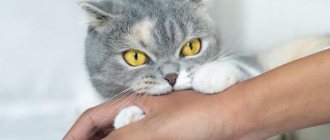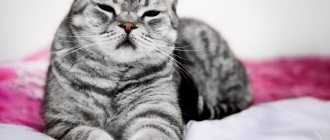Predicting cat behavior can be very difficult, and its reasons sometimes remain a deep mystery to the owner. Cats screaming at night is a very common phenomenon, but it is difficult to talk about clear reasons for it. Night “concerts” can be either a good old tradition for some pets or a completely sudden exception to the rule that stuns the owner. In this regard, the question of how to wean a cat from yelling in the morning requires special consideration.
How to stop a cat from yelling in the morning
Even owners of the most docile and quiet cats may one day encounter such an acoustic phenomenon. The desire to re-educate a cat and remove its need to scream is quite natural. We will talk about how to do this without harm to the pet’s health and the owner’s sleep in this article.
Rhythms of a cat's life
Some individuals wake up their owners with such precision and consistency that one might suspect that they have their own Swiss watch, with which the animals check the time of their vocal training. This is partly true, but only partly.
The owner always takes an important part in the cat's sleep and wakefulness patterns.
Cats do not have the abstract, abstract understanding of time that humans have. Time is important for them only from a utilitarian point of view - as an indicator of satisfaction of their needs. Therefore, the most common reason for morning cat “concerts” is the need for food. As soon as the sleep-deprived, irritated owner pours the treasured delicious granules into the cat’s bowl, he calms down and goes about his business.
Even though cats are designed to be nocturnal, their biological clocks can shift.
Felines – wild or domesticated – always adapt their own rhythm of life to the conditions in which they find themselves. Having no idea about human daily routines, cats very quickly figure out at what time it makes sense for them to leave their homes and go outside, and at what hours it is preferable to stay in the shelter.
Cats get used to the routines they establish together with their owner.
In the same way, domestic cats measure their behavior with their owner’s lifestyle. From this we can conclude that many cats that scream in the morning, one way or another, received positive reinforcement from the owner. Often such reinforcements are not noticed by the person himself, which leads to mutual misunderstanding.
How to stop a cat from waking up its owner early in the morning
It is necessary to exclude all psychological and physical injuries that can only be cured with the help of medications, and proceed to training the cat. Representatives of the cat family are quite difficult to train. And it’s not a matter of mental abilities - cats are very harmful and stubborn.
To wean your pet from waking up its owners in the morning, you need to show persistence and determination, otherwise nothing will work out.
There are several options for influence:
- Daily Routine – Most cats begin to change their behavior when it normalizes. It is necessary to accustom the animal to eating at specific morning and evening hours. This method may take a lot of time, but the result will always be positive.
- More toys and games - all cats are quite energetic, they can play and run for hours. But they sleep no less. Try to pay more attention to the animal during the day, as well as in the evening. It must spend all its energy so that in the morning it has no desire to wake up its owner.
- Hunger Problem – Some cats feel hungry all the time, and this is normal. In such cases, the animal should be fed heavily in the evening or left with food for the morning.
Nocturnal lifestyle
Before moving on to the reasons for unwanted behavior in cats, it should be remembered that all felines are active primarily at night or in the early morning hours. This rhythm of life gave wild cats an advantage over prey and other predators, which were less active after sunset.
Cats' visual organs are also geared towards a nocturnal lifestyle; they function even worse in illuminated conditions than in twilight. In a word, even cat physiology is on the side of their activity from dusk to dawn.
For wild cousins of domestic cats, night hunting is a way of survival
However, the millennia lived side by side with humans were not in vain for cats. Pets, in the process of long evolution, have learned to adjust their rhythms of life to human rhythms. Nowadays, it is not uncommon to find cats sleeping side by side with humans. But you need to keep in mind that cat sleep has little in common with human sleep.
Instead of sleeping once a day, cats take short naps of a few minutes each.
Cats sleep very lightly and often wake up, since full, deep sleep is an unaffordable luxury for them. Wild cats couldn’t afford it and slept in “portions.” This sleep order was passed on to their distant domestic descendants.
Why are they doing that?
No, not in order to piss off a person and laugh evilly in your dark cat soul.
Cats are nocturnal predators who sleep during the day, saving energy. At night they are alert and ready for adventure. Naturally, during eight hours of wakefulness, the cat will get hungry and will go to the food source - a person. There is a small nuance. If a cat is accustomed to receiving food at will (it will be given as it asks), then it will not care what a person does when it feels hungry. An animal accustomed to receiving food on a schedule will most likely wait until the owner wakes up.
If your cat has never woken you up in the morning before and suddenly insists on attention at four in the morning, listen to your pet. Perhaps something happened in the house or the animal is unwell.
The role of the owner in raising a cat
As already mentioned, unwanted behavior in pets is most often associated with unconscious reinforcements from the owner. A person should never forget that cats are very sensitive to the sequence of his actions. Even if the owner does not undertake to raise his pet, he still, one way or another, educates him, introducing him to the principles of desirable and undesirable behavior in his own way.
A common mistake an owner makes is to assume that the cat will be able to immediately understand what is required of him.
Of course, felines understand everything in their own way. Therefore, what seems elementary and self-evident to a person may not be so to a cat. For example, if on weekdays a cat comes to you when you are already up and pours food for him, then this behavior is reinforced in the form of food. However, on weekends, when the cat is already ready to feast, he encounters a sharp rebuff from the owner.
For your cat to correctly decipher your instructions, they must be consistent and predictable.
Such unmotivated, from a cat’s point of view, behavior leads to frustration for the pet. Cats are not familiar with the concept of weekends. The pets have learned their schedule, created in partnership with the owner, and their desire is very simple - to adhere to the “rules of the game” and get what they want. But as soon as they get used to the schedule, the owner breaks it and delays breakfast by two or three hours.
In trying to achieve the desired results, some cats do not know the limits
In such situations, cats inevitably experience stress - on a larger or smaller scale. Vengefulness, coupled with unsatisfied needs, sometimes pushes cats, depending on the degree of their depravity and ingenuity, to perform various tricks. All means available to the pet are used:
- Monotonous scratching of glass;
- Biting a person on different parts of the body;
- Pulling the blanket;
- Relieve yourself on the pillow;
- Ripping off wallpaper nearby;
- Sudden jumps on the owner.
How to wean it off?
Be patient first.
Cats are conservative and do not like to change their behavior if everything suited them before. Consider your pet's personality. Stubborn cats will take months to rehabilitate, while more flexible ones will take several days. The obvious way to wean your cat off the morning wake-up call is to ignore it. Each time the owner succumbs to the pet’s “persuasions,” he reinforces his behavior. The “morning-person-food” pattern becomes familiar to the cat. Ignoring it makes it clear that the scheme is not working.
It will take several sleepless nights to “explain” this to the cat. When you wake up, do not get out of bed, pretend that you are still sleeping. Think about your own things, but don’t react to the cat in any way. Over time, he will understand that he can only get food when the person himself wants to get out of bed.
It is important to be consistent and not give yourself any slack. Once you get up once, all previous ignoring will become unimportant.
Advice to splash the cat with water, throw it off the bed, or spank it will work, but not as much as we would like. Cats will not only not understand why the owner is behaving inappropriately, but they will also begin to fear the person. Morning wake-ups are likely here to stay. The cat will continue to wake up the owner, but will act carefully, running away with every sudden movement.
Reasons for cats crying in the morning
Vocal exercises are not always a result of hunger or a desire for attention. The reasons for cat screams are varied - from the most harmless need to communicate with the owner to serious pathologies. Therefore, it is advisable for the owner of a vocal cat to monitor not only the fact of screams, but also their frequency, the conditions in which the screamer manifests itself, and so on. The most common reasons for cat arias are presented below.
Table 1. Causes of morning cat crying
| Cause | Description |
Hormonal background | Hormones have a particular effect on uncastrated individuals. Changes in behavior accompanied by a prolonged loud meow may be associated with the onset of sexual heat in females. The calls of females are an important ritual for attracting males for the purpose of having offspring. Males prefer marking corners to acoustic manifestations of sexual need. This problem can only be solved by timely castration, since no educational influences can lull the sexual instinct in a pet. However, it is worth considering that residual elements of sexual heat may remain even when the reproductive organs are removed |
Disease | Some diseases worsen at night and in the pre-dawn hours, which sometimes makes their identification difficult. A seemingly healthy cat during the day begins to scream at night, as if possessed. Diseases that manifest themselves fully under the cover of darkness include all kinds of parasitic diseases, urolithiasis, arthritis and arthrosis. If a previously calm cat begins to stage concerts, you should carefully examine him, or, even better, entrust the examination to a veterinarian. Excluding physical pathologies in advance will simplify the education process and will not allow the disease to quietly become chronic. |
Intense experiences | Increased anxiety may occur in a cat when the environment changes or any change in the usual rhythm of life. Moving, the arrival of new people or pets in the house, renovations - all this is acutely felt by pets and affects their internal sense of comfort. Moreover, cats never remain indifferent to the psychological climate in the family. There are cases when, after the owner's quarrels, the cat did not find a place for itself for a long time. Anxiety and nervousness are common to varying degrees in both people and their pets. At such moments, trying to suppress the meowing of a distressed cat will only worsen the situation. |
Territorial issue | This reason applies to a greater extent to small apartments in which the cat shares a common room with the owners. However, in spacious houses a similar problem sometimes appears. The fact is that a cat needs its own “corner” - both in the wild and in domestic conditions, the distribution of boundaries is very important for cats. In their absence, pets' behavior may change for the worse. Cats wake up for various reasons, since they are sensitive to the slightest rustle due to their developed hearing. If they have their own territory, where they can hunt for flies and look out the window, then they will not come to visit someone else’s |
Excess energy | Cats, sleeping 16-20 hours a day, just like other living organisms, need to relax. If your pet's short waking hours occur in the pre-dawn hours, prepare for surprises. Not only screaming will be used, but also the famous running along the corridors, climbing through closets and extreme descents from curtains - depending on the physical inclinations of the cat. Owl cats are prone to hunting at night, trying to catch flying flies or spiders running under the baseboard. |
To attract attention | Despite the fact that cats rarely seek a human reaction for the sake of the reaction itself, there are individuals who want to occupy all the owner’s time with themselves. Keep in mind that there are breeds that require increased attention due to their temperament. These breeds include Siamese cats, Ukrainian Levkoys, Orientals, etc. More often, such behavior has very specific utilitarian goals, which the pet hints at. The reason for the scream is not always a whim - the cat can convey information about a dirty tray or empty bowls of food or drink. To avoid such situations, leave food and fresh litter for the cat overnight. |
Mental pathologies | Some cats have an unstable psyche and react violently even to situations that do not involve such behavior. Since educational measures in this case are of little use, only a veterinarian can help. There are special sedatives for cats that help pets come into harmony with themselves. However, they are prescribed only when necessary and are taken under the close supervision of a doctor. |
Many owners lose sight of the likely painful underlying cause of cat cries and recognize pathologies in the later stages. To avoid such situations, it is advisable for cat owners to have basic knowledge about common ailments among their pets. You can find out more about the main cat diseases and their symptoms on our portal.
Reasons for cats waking up early
Turning to history, we know that cats have lived next to people for more than 10 thousand years. This period of time was more than enough for the tailed animals to learn to coexist with their owners without conflicts. Moreover, cats are very territorial, but they perceive people as members of the pack, protect and protect them. If this algorithm has been embedded in the behavior of cats for centuries, for what reason could the “failure” occur?
Anxiety
It’s not in vain that we talked about the territory. One of the first reasons why a cat may sleep poorly, constantly worry and wake up the owner is the lack of clear boundaries.
In the pet's understanding, the living area should be divided into:
- Shelter.
- Place for eating.
- Protected area.
Unlike dogs, cats tend to separate their sleeping area from the owner’s, so if a comfortable lounger is equipped for the pet, it will not fit into the owner’s bed. However, if your pet does not have a place where he feels completely safe, he will not sleep all night. Until the moment the sky turns gray, the night remains quiet, but with dawn, birds and insects wake up, reaching for the warmth of the sun. Birds hunt insects, and this is a whole bustle, inaudible for you and very noisy for your pet.
If the natural course of nature is joined by bad weather, wind, noisy people going to work early in the morning, a period of wakefulness begins for the cat. A pet simply cannot sleep if it does not feel safe, and he wakes you up to make sure that he is not alone on the “barricades of defense.”
Rhythm of life
Cats are very constant, they prefer to live their lives according to a certain schedule. Simply put, if a cat is used to getting up at 5 am, then there are reasons for this. Let's not forget that the cat is a nocturnal predator . Our pets' sleep at night is a favor, an adaptation, but not a natural norm. Of course, if a cat had to forage for its own food, it would not be able to afford to sleep at night. As long as you keep your cat's diet balanced and nutritious, it is more beneficial for her to adapt to your daily routine.
You may know that cats sleep up to 18 hours a day, that is, at least 6 hours the pet needs something to do. Part of this time will be spent eating, washing, performing natural needs, communicating with the owner or passively observing his behavior.
Whatever one may say, at least for several hours, the pet has nothing to do and this moment is decisive. If the cat does not need to do anything during the day or evening, it will go to bed and, naturally, wake up earlier. If you find something to keep your pet occupied, he will get tired, go to bed at about the same time as you and sleep for 8–9 hours straight.
Note! Many cats do not sleep at night due to instincts, but they behave quietly and do not cause inconvenience to their owners.
Several free hours a day can be spent sleeping without consequences in the autumn and winter seasons. The colder it is outside, the more the cat strives to conserve energy - this is an instinct. In addition, in the fall, pets try to gain weight in order to comfortably survive the cold.
Stress
Any event that does not happen constantly is stressful for the cat. How the changes will affect the pet depends on the psyche and external circumstances. For example, moving is a very serious stress. Severe shocks include the appearance of a new pet in the house, a change of furniture, or renovations. Very often cats are embarrassed about the arrival of a child in the family and they can be understood. Stresses of a lesser degree include the arrival of guests, the owner being late at work, a quarrel in the family, or loud noise from neighbors.
If a cat wakes up early in the morning and appears agitated, it should not be pitied or punished. The pet needs to be equipped with a shelter and given the opportunity to adapt on its own.
Pain
Many cat owners share their own disappointing experiences on forums. The stories begin the same way - he yelled, and we punished. Only every time it turned out that the pet was sick and he was screaming because he was calling for help. Before taking any action on your pet, make sure it is healthy.
A cat may scream in the morning in pain due to:
- Urination – urolithiasis or cystitis.
- Trying to eat - diseases of the teeth, gums, and oral cavity.
- Changing posture - arthritis, arthrosis, problems with the spine.
- Meteor dependence is a headache.
And this is not the entire list. Watch your pet night owl carefully if its behavior comes as a surprise. If your cat starts waking you up early in the morning, but has never done this before, this is a reason to contact your veterinarian for a routine examination. In the best case, the doctor will not find anything and you will have to start raising your pet.
Hunger
The most common and commonplace reason for the owner waking up early is the cat’s hunger. As mentioned above, your pet has more acute hearing and always wakes up before you. If the cat is fed, warm and in a comfortable environment, it will drink water, go to the litter box and go to bed before you wake up. If the pet is hungry...he will look for ways to solve his problem.
Note! Adding food for future use to solve the problem of waking up in the morning is not a solution. The cat should receive food on a schedule.
The solution to this problem lies in the basic rules for keeping animals - feeding on a schedule. A cat's digestive system works at a specific pace. After eating food, it takes 6-8 hours for your pet to become hungry. If you time the last feeding correctly, you won't have to get up at 5 a.m. for your cat to have breakfast.










